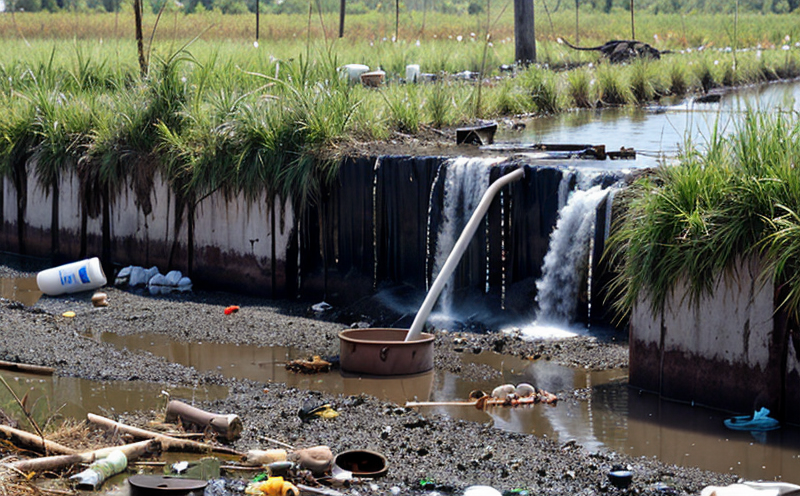Gypsum Pollutant Testing
When it comes to gypsum pollutant testing, precision and accuracy are paramount. This service focuses on identifying pollutants in gypsum materials that could potentially harm the environment or human health. Gypsum, primarily composed of calcium sulfate dihydrate (CaSO₄·2H₂O), is widely used across various industries including construction, agriculture, and water treatment. The integrity of these applications relies heavily on ensuring that any pollutants present do not compromise safety or compliance with environmental regulations.
The testing process involves a series of steps designed to identify trace elements and contaminants in gypsum samples. These can include heavy metals like lead (Pb), mercury (Hg), arsenic (As), cadmium (Cd), chromium (Cr), and selenium (Se). The presence of these pollutants, even in low concentrations, can have significant environmental impacts if not controlled.
Our laboratory utilizes state-of-the-art analytical instrumentation such as Inductively Coupled Plasma Mass Spectrometry (ICP-MS) and Atomic Absorption Spectrophotometry (AAS) to conduct this testing. These techniques allow for the detection of trace elements down to parts per billion levels, ensuring that even minute amounts of pollutants are accurately measured.
The process begins with thorough sample preparation which involves crushing, sieving, and homogenizing the gypsum samples. This ensures a representative sample is analyzed. Subsequent analysis using ICP-MS or AAS provides precise measurements of trace elements. The results are then reported according to international standards such as ISO 17025, ensuring accuracy and reliability.
Understanding the environmental impact of pollutants in gypsum requires knowledge of how these materials interact with their surroundings. For instance, heavy metals can leach into soil or water bodies, posing risks to ecosystems and human health. By identifying these pollutants early on through testing, we can help prevent potential harm.
The importance of this service cannot be overstated. In sectors like construction, where gypsum is used extensively, it's crucial to ensure that the materials are free from harmful contaminants. This not only enhances safety but also ensures compliance with environmental regulations and industry standards.
| Element | Units | Method of Detection |
|---|---|---|
| Lead (Pb) | µg/g | ICP-MS |
| Mercury (Hg) | µg/g | ICP-MS |
| Cadmium (Cd) | µg/g | AAS |
| Chromium (Cr) | µg/g | AAS |
| Selenium (Se) | µg/g | ICP-MS |
Why It Matters
The importance of gypsum pollutant testing extends beyond mere compliance with regulations. Properly identifying and managing pollutants in gypsum can have far-reaching benefits for both the environment and human health.
In construction, where gypsum is used extensively as a building material, any pollutants present could potentially leach into surrounding soil or groundwater if not controlled properly. This can lead to contamination of water sources, affecting both plant and animal life, as well as posing risks to human health through ingestion or inhalation. By conducting thorough pollutant testing, we help ensure that materials used in construction projects are safe and sustainable.
In agriculture, gypsum is sometimes used as a soil amendment to improve fertility. However, if it contains harmful pollutants, these can be inadvertently transferred to crops, leading to food safety issues. Our testing ensures that only clean, safe gypsum reaches agricultural applications, thereby safeguarding both the environment and public health.
Water treatment facilities also rely on gypsum for various processes. Ensuring that the gypsum used is free from contaminants helps prevent contamination of treated water supplies, maintaining the integrity and purity of these resources.
In summary, gypsum pollutant testing plays a critical role in safeguarding both the environment and human health by ensuring that materials are free from harmful pollutants. This not only meets regulatory requirements but also supports sustainable practices across various industries.
Industry Applications
Gypsum pollutant testing finds application in multiple sectors where gypsum is used or processed. Here’s a look at some of the key areas:
| Sector | Application |
|---|---|
| Construction | Ensuring that gypsum used in construction projects does not contain harmful pollutants. |
| Agriculture | Verifying the safety of gypsum used as a soil amendment to prevent contamination of crops and soil. |
| Water Treatment | Maintaining the purity of water supplies by ensuring that gypsum used in treatment processes does not introduce contaminants. |
| Fuel Production | Monitoring for pollutants that could affect the quality and safety of fuel products derived from gypsum. |
| Paper Manufacturing | Guaranteeing that gypsum used as a filler in paper production is free from harmful elements to ensure product quality. |
| Sewage Sludge Management | Identifying pollutants in gypsum-based products used for sewage sludge treatment to prevent environmental harm. |
In each of these sectors, the presence or absence of certain trace elements and contaminants can have significant implications. Our testing service provides critical insights that help maintain quality standards and ensure compliance with relevant regulations.
Quality and Reliability Assurance
The reliability of our testing services is underpinned by strict adherence to international standards such as ISO 17025. This ensures that all tests conducted are accurate, repeatable, and reliable. Our team of experienced analysts uses the latest technology and methodologies to provide precise results.
Quality control measures include regular calibration of instruments, participation in proficiency testing programs, and continuous training for our staff on the latest techniques and best practices. These efforts ensure that every sample analyzed is handled with care and precision, leading to trustworthy results.
The importance of these measures cannot be overstated. In industries where safety and compliance are paramount, such as construction and agriculture, any discrepancy in testing could have serious consequences. By maintaining the highest standards, we provide peace of mind to our clients knowing that they can rely on accurate and reliable data from us.
Our commitment to quality extends beyond just laboratory practices. We also work closely with clients throughout the process, providing expert advice and support to help them make informed decisions based on our findings. This collaborative approach ensures that our testing services meet not only technical requirements but also business needs.





